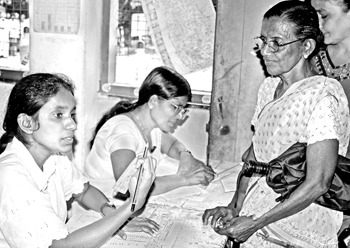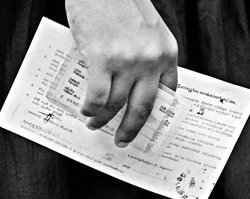The lack of interest on the part of the people and failure by political parties and civil organizations to create public awareness regarding the necessity to possess a government-issued identification document, to cast a vote, led to thousands being disenfranchised during last week’s elections to the North Central and Sabaragamuwa provincial councils.
Many who turned up at polling booths had only their polling cards and were thus not allowed to vote. Many claimed they were not aware of the requirement.
Speaking to The Sunday Times, Minister of Urban Development and Water Supply Dinesh Gunawardena, chairman of the Parliamentary Select Committee for Electoral Reforms said politicians, candidates, election representatives and the public must cooperate with one another to make the electoral register accurate.
 |
| Officials at a Sabaragamuwa polling booth checking an NIC |
He complained there was little public enthusiasm when it came to getting National Identity Cards to cast a vote although when it came to going abroad or sitting for exams people would somehow obtain an NIC if it was required.
In a move to drive home the importance of obtaining NICs, the minister says the committee and the Elections Commissioner have decided to declare a specific month for those who do not have NICs to get them and thereafter make the possession of an NIC mandatory to all citizens.
According to the Elections (Special Provisions) Act 14 of 2004 voters are required to produce a valid identity document to the presiding officer of the relevant polling station. However this Act was not strictly implemented until last week’s provincial elections.
A recent Elections Department circular defined a valid identity document as any document issued by the government, containing a photograph of the bearer, certified by a Grama Niladhari or an Estate Superintendent in the case of plantation sector workers, and authenticated by a Divisional Secretary or an authorised Elections Commission official.
“This was put in to place to counter impersonation of voters at elections, and thereby reduce election-related fraud,” Commissioner of Registration of Persons Department, A. G. Dharmadhasa said.
He said although the NIC is a must, there were alternatives especially for elections and political parties and other civil organizations should have played a bigger role in educating the public during the campaign at least.
“We received more than 1500 NIC applications just one or two days prior to elections day and we were unable to issue these on time. However, we issued more than 10,000 NICs to applicants from the two provinces from August 6 to 19 and they were handed over to the Divisional Secretaries on August 19 so that they could be issued to the applicants on time enabling them to cast their vote on August 23,” Mr. Dharmadhasa said.
He said delays occur only if applicants had not handed over required documents and the application forms were incomplete. Such applications are sent back to the divisional secretaries who send them to the Grama Niladhari’s.
According to election monitors, around 5% of the voters were turned away at last week’s provincial polls as they were unable to produce a valid identification document.
People’s Action for Free and Fair Elections, (PAFFREL’s) deputy Director Rohana Hettiarachchi said during previous elections this rule was not strictly enforced, especially rules regarding temporary identity cards. This led to various election-related frauds including impersonation and the use of forged identity cards.
 |
| A voter armed with polling card and NIC at last week’s elections |
“This time the Elections Commissioner clearly set out the rules regarding identification and they were strictly followed,” he said.
It was also observed that around 30-40 percent of estate-workers in the Ratnapura district were unable to cast their vote due to their inability to produce proper identification documents.
“These people rarely come to town to attend to paperwork especially since they would lose a day’s wage if they did so,” said CWC’s vice president R. Yogarajan.
He also pointed out that the language barrier was one of the main hurdles that discouraged estate workers from applying for NICs.
Political parties meanwhile said the hassle one had to undergo to obtain an NIC resulted in a lack of interest among the people.
UNP’s General Secretary Tissa Attanayake said very little public awareness had been created regarding the importance of having an NIC especially in the outstations.
“The government should conduct awareness campaigns regarding the importance of having an ID for future elections, otherwise many may not be able to cast their vote which will amount to a violation of one’s fundamental right to vote,” he said.
JVP’s Sabaragamuwa Chief ministerial candidate Chameera Koswatte said the people in rural areas don't feel the urgency of possessing an NIC as they hardly go into the city or banks and other government offices for their day-to-day work.
“Their activities are largely limited, to the household or the village. In addition there are many practical problems they have to face to get an NIC the cost of photographs, the cost of travelling and the hassle of meeting government officials,” he said.
Anuradhapura’s Deputy Elections Commissioner S.M.S. Bandulasena said around 19,000 NICs had been issued just prior to the elections. Out of the total 60% voter turnout, only an estimated 1% had been denied the right to vote because of their inability to prove their identity.
With future elections pending in at least five provinces and a valid government identity document being made compulsory for voting, political parties, civil organisations and the public will have to be more geared towards creating an awareness of obtaining NICs.
| 

